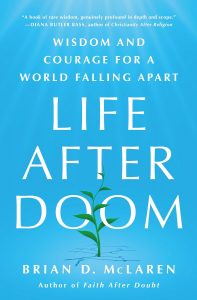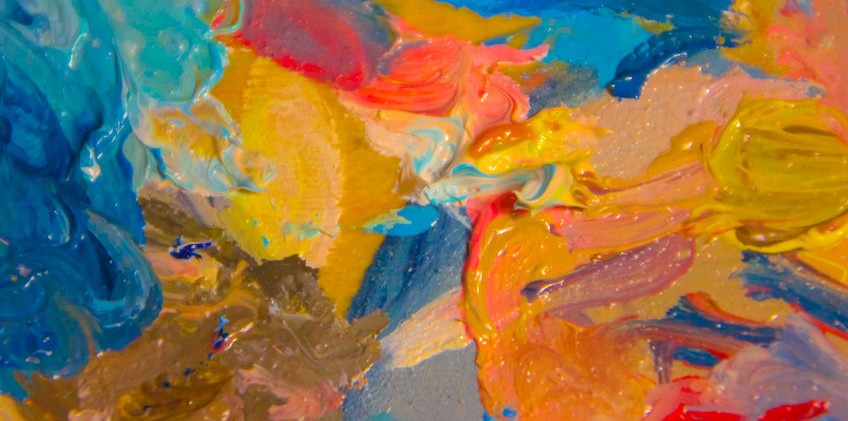Americans must connect the dots between the earth’s climate crisis and the resurgence of Christian nationalism and white supremacy, according to activist and theologian Brian McLaren. But they must do so without falling into defeatism or complacency, he added.
“The fact that the environment influences every dimension of life makes it of special concern,” McLaren explained during a recent episode of the “The State of Belief” podcast moderated by Interfaith Alliance President Paul Raushenbush.
“It’s easy for climate to get off of the headlines unless Canadian wildfires bring a cloud of smoke in our direction or unless the headlines are saying we’ve just had the hottest month or the hottest year,” McLaren said. “But once the headline is gone, it is easy to forget about the environment.”
Raushenbush interviewed McLaren about his new book, Life After Doom: Wisdom and Courage for a World Falling Apart, which implores readers to wake up to the reality of global climate change and to the toxic theologies and authoritarian ideologies that minimize or deny its destructiveness.
The environment plays that central role because it creates or exacerbates other social and economic challenges.
The environment plays that central role because it creates or exacerbates other social and economic challenges, McLaren said. “We start to make a little bit of progress on race relations or a little bit of progress on gender equality, and then the climate crisis sends us a couple billion refugees needing a place to live which fans the flames of bigotry and fear and xenophobia.”
Progress in reducing world hunger and poverty over the past two decades also has been threatened by climate change, he added. “It doesn’t take too many environmental crashes, floods, famines and droughts to send more people into poverty again or to throw our economies into such a tailspin that people end up in poverty who had just gotten out.”

Brian McLaren
The fear and political unrest sparked by weather-related calamities then sets the conditions for rising authoritarianism, white supremacy and the further consolidation of wealth and power in the hands of a small number of people, he continued.
Further obscuring the climate challenge are end-times theologies that value eternal life over a world considered to be flawed and destined for annihilation by an angry God: “The starting point is that God created the world perfect, people did something really bad, and ever since God has planned to destroy the earth. So, the drama of this life is trying to get your soul right with God before you either die or God shuts the whole thing down and you stand before him on judgment day.”
McLaren shared that he grew up in a Christian tradition that longed for the rapture, the belief that God will whisk the saved to heaven before the planet undergoes its divine demolition. But similar beliefs can be found in Judaism, Islam and other faiths, he said.
“What this means is the more devout I am, the less concerned I am about politics or ecology or racism or human suffering and injustice and oppression and slavery and so on, because these are just temporal anomalies. And soon we’ll get to what really matters.”
Faith itself can be a negative influence on interplay between environmental decline and totalitarianism, he said. “Religion, including Christianity, can serve as an aggregator for authoritarian movements. That’s been happening all through our history. This is a time we’re having to stand up to it once again, and all of us can raise our voices in intelligent ways.”
 On the other hand, even individuals who consider the environment as sacred can fall victim to misguided attitudes, McLaren said. “I notice that my brain wants to default to one of two things. It wants to say somebody’s got a technological fix, everything’s going to be fine, or it wants to say it’s too late, we can’t do anything, there’s no use trying. And what I notice about those two reactions of my brain is that both give me permission to be complacent.”
On the other hand, even individuals who consider the environment as sacred can fall victim to misguided attitudes, McLaren said. “I notice that my brain wants to default to one of two things. It wants to say somebody’s got a technological fix, everything’s going to be fine, or it wants to say it’s too late, we can’t do anything, there’s no use trying. And what I notice about those two reactions of my brain is that both give me permission to be complacent.”
Raushenbush noted that Life After Doom provides spiritual resources for those who want to engage in creation care. These include the Bible, indigenous wisdom, poetry and the teachings of Mahatma Gandhi.
“Along with the beauty of nature, something I have to keep reminding myself is to pay attention to the beauty in people,” McLaren responded. “I’m obsessed with the stupidity of people right now, and with the cravenness of politicians and the shortsightedness of billionaires. I am ticked off about that. I’m angry about that, and it’s easy for that to take over.
“So, I have to just pause and realize there is a beautiful human being doing good things for every one of those horrible people doing terrible things. There are thousands of people doing beautiful things.”


